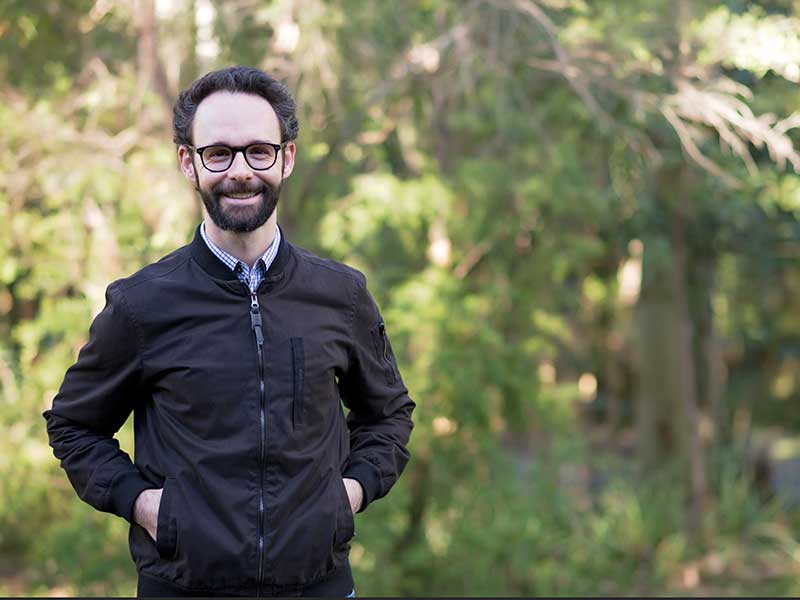Researcher Highlights
Hindsight, Prediction and a Final Decision
University of Newcastle Researcher Dr Guy Hawkins chooses to spend his days developing and testing computational and mathematical models of cognitive processes, with a primary focus on the psychology of decision making.

We’ve all made a snap purchase at the end of a day of careful browsing, or watched quiz show contestants panic and suddenly change their answer at the last second. On a wider scale, history is littered with the catastrophic side effects of bad choices, snap decisions and mistakes made on the fly.
Some prefer to leave mistakes in the past and move on. On the contrary, Dr Guy Hawkins argues, the best way to learn to make better choices is by examining the mathematical and mechanical minutiae of the decision making process.
“My belief is that by understanding the psychological processes that influence how people make decisions, and the external factors that may impinge on those decisions, we can facilitate the environment in ways that help people make better decisions.”
In his research, Guy is investigating the decision mechanisms and strategies that people use to select consumer products and service options.
FACILITATING ENVIRONMENTS
So, how does this research inform society in practical terms?
“A simple example is that we know people find it easier to understand counts than probabilities,” Guy explains.
“People make fewer and less extreme reasoning errors when asked to make decisions about information when in the format of ‘8 out of 10 people will develop a symptom’ (counts), rather than ‘80% of people will develop a symptom’ (probabilities).”
“We can then use this knowledge to help people make more informed and less error prone decisions.”
For instance, physicians could describe potential prognoses with counts rather than probabilities, allowing patients to make better informed treatment choices.
A better understanding of decision making processes helps keep workplaces safe and productive too.
“In organisational contexts one can investigate whether an incorrect action or decision was the result of poor consideration of the evidence or insufficient time allocated to the decision,” Guy explains.
“The outcome implies a particular avenue for remediation and behaviour change: training proficiency in evaluating evidence or altering system processes to provide more time to make important decisions.”
And because consumerism is all about decisions, companies whose core business is conveying information about uncertain outcomes, like insurance agencies, can utilise Guy’s research. Not only to develop a better understanding of statistical reasoning and consumer preference, but to improve communications and marketing.
SEARCHING FOR COMMONALITIES
Surely choosing between brands of biscuits and opting for a risky medical treatment are hardly comparable?
Although there are clear surface-level differences between the gravity of these choices, a key challenge in Guy’s research is using computational and neural models to identify commonalities.
Ultimately, he explains, all decisions require the base processes of perception, evaluation and action. From simple detection requiring rapid action through to making choices with only limited or ambiguous input, we use a similar framework to make many small and not so small decisions every day.
“I am most excited about finding so-called ‘domain general’ mechanisms.”
“This means finding psychological processes that are common to how people make decisions in seemingly very different situations, like detecting the colour of a traffic light and evaluating features of a consumer product.”
Another area of focus has been on how people update the care with which they decide relative to the time frame and quality of options available.
“If we don’t come to a decision quite quickly, we tend to become increasingly willing to make decisions on the basis of less evidence – we become less and less cautious as the decision takes longer and longer.”
My research has aimed to discover factors that influence when we use this strategy to make decisions. For example, is it when we’re under time pressure? Or when the decision is likely too difficult?
IMPROVING OUTCOMES
Guy began his research journey completing his PhD in Newcastle. This work earned him a Postdoctoral Research position at UNSW looking at judgement biases exhibited when reasoning with statistical information.
Two years at the University of Amsterdam’s Brain and Cognition Center followed, utilising computational and neural methods to explore the effect of mind wandering on the ability to complete simple tasks.
Returning to Newcastle in 2017, Guy collaborates with fellow mathematical psychology researchers in the Newcastle Cognition Laboratory and cognitive neuroscientists in the Functional Neuroimaging Laboratory. He also works with researchers at universities in Australia, USA, Canada, UK, The Netherlands, and Norway.
For now, he chooses to stay at the University of Newcastle, working with numbers, neuroscience and the process of making big and small decisions. And apparently, we have much still to learn about making better choices.
“We know there are similarities in the underlying decision processes, yet we have limited understanding of their structure, function and activation in different situations,” Guy says.
“Finding those similarities and capitalising on them so as to improve decision outcomes for people is what keeps me excited about this research.”
The University of Newcastle acknowledges the traditional custodians of the lands within our footprint areas: Awabakal, Darkinjung, Biripai, Worimi, Wonnarua, and Eora Nations. We also pay respect to the wisdom of our Elders past and present.
